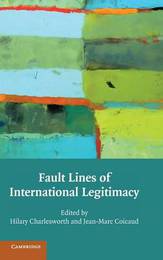
|
Fault Lines of International Legitimacy
Hardback
Main Details
| Title |
Fault Lines of International Legitimacy
|
| Authors and Contributors |
Edited by Hilary Charlesworth
|
|
Edited by Jean-Marc Coicaud
|
| Physical Properties |
| Format:Hardback | | Pages:418 | | Dimensions(mm): Height 229,Width 152 |
|
| ISBN/Barcode |
9780521764469
|
| Classifications | Dewey:341 |
|---|
| Audience | | Professional & Vocational | |
|---|
|
Publishing Details |
| Publisher |
Cambridge University Press
|
| Imprint |
Cambridge University Press
|
| Publication Date |
25 February 2010 |
| Publication Country |
United Kingdom
|
Description
Fault Lines of International Legitimacy deals with the following questions: What are the features and functions of legitimacy in the international realm? How does international legitimacy, as exemplified in particular by multilateral norms, organizations, and policies, change over time? What role does the international distribution of power and its evolution have in the establishment and transformation of legitimacy paradigms? To what extent do democratic values account for the growing importance of legitimacy and the increasing difficulty of achieving it at the international and the national level? One of the central messages of the book is that, although the search for international legitimacy is an elusive endeavor, there is no alternative to it if we want to respond to the intertwined demands of justice and security and make them an integral and strategic part of international relations.
Author Biography
Hilary Charlesworth is an Australian Research Council Federation Fellow and Director of the Centre for International Governance and Justice at the Australian National University, Canberra. She has written widely on international law and human rights law and has held visiting appointments in U.S. and European universities. Jean-Marc Coicaud is the Director of the United Nations University (UNU) Office at the United Nations in New York. His published books include L'introuvable democratie autoritaire, Legitimite et Politique, Politics and Legitimacy: A Contribution to the Study of Political Right and Political Responsibility, Beyond the National Interest, and Limits of the UN/Future of the UN. He is now finishing a new book titled Kissing War Goodbye.
Reviews"International relations scholars and practitioners have a long-standing concern with the legitimacy of political actions because it influences their occasions, their shape and their efficiency. Particularly since the Independent International Commission on Kosovo described NATO's bombing of Serbia as inconsistent with the UN Charter and hence formally illegal but nevertheless legitimate, International lawyers have increasingly shared that concern with the knowledge that a wide split between legality and legitimacy, whatever its other consequences, is bound to heighten skepticism about the obligation to comply with international law. Thus the timing of this elegantly conceived and executed volume could hardly be more felicitous. The multiplicity of authors enriches the volume, for they illuminate probably better than any single author could, the various ways in which 'legitimacy' is, can, and should be understood. The editors deserve admiration for the depth, range, and coherence of this fine work." --Tom Farer, Dean, Josef Korbel School of International Studies, Denver University "Legitimacy is unstable terrain. Fault lines mark the movement of its legal, normative and political tectonic plates: this results in release of pressure, some beneficial adjustment, and periodic shocks. It is this terrain - human rights, military intervention, peacekeeping, and international administration - that is mapped by a distinguished group of analysts. They have given us a very valuable addition to the growing literature on international legitimacy." --Ian Clark, ESRC Professorial Fellow and E H Carr Professor, Department of International Politics, Aberystwyth University
|